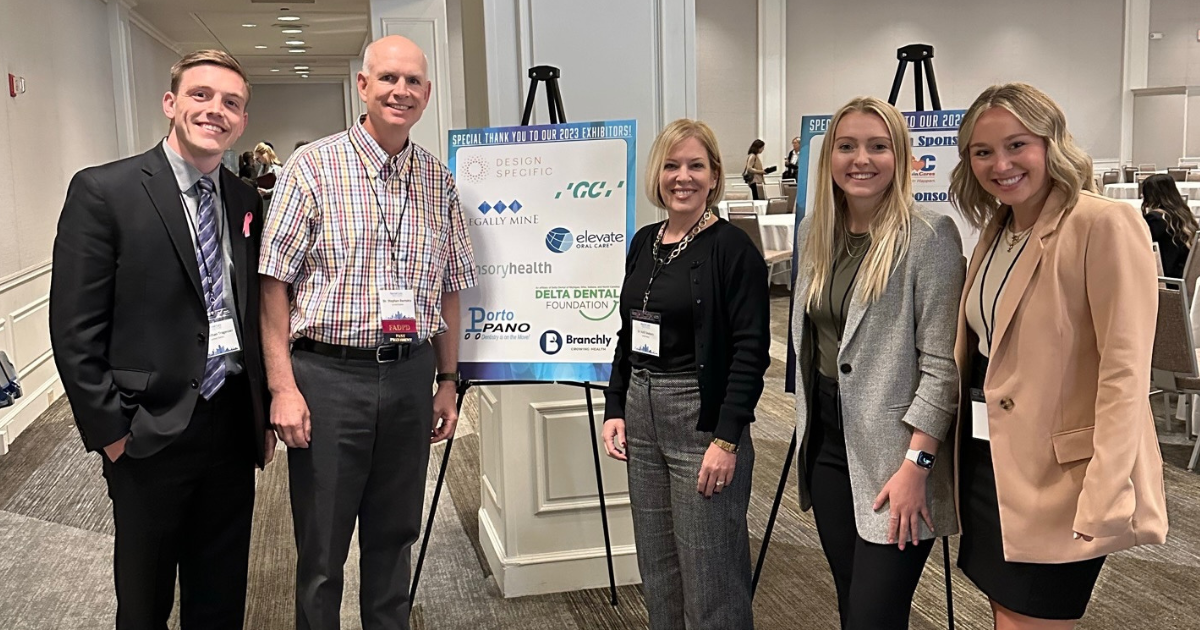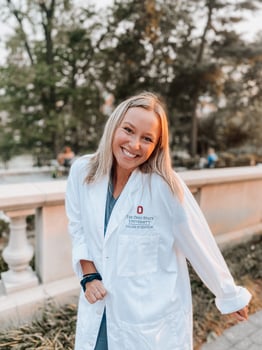Student grants support oral health equity learning beyond the classroom

You can’t learn everything in a classroom—even if it’s a really, really good one.
But getting dental students out of the classroom and into the venues where they can learn more about public health dentistry and caring for people with disabilities can be prohibitively expensive.
That’s where the Delta Dental Foundation (DDF) comes in. As part of our commitment to workforce development, we offer grants to send dental students in Michigan, Ohio and Indiana to conferences that teach them how to meet everyone’s comfort level and abilities across the lifespan.
This year, we sent nine students from The Ohio State University (OSU) College of Dentistry and Case Western Reserve School of Dental Medicine to the Special Care Dentistry Association’s (SCDA) annual meeting in Dallas, Texas. The SCDA’s meeting is designed to help oral health professionals connect, collaborate and create change in the field of dental care for people with disabilities.
For Sydney Sherek, a fourth-year dental student at OSU, the SCDA meeting was clarifying.
 |
| Sydney Sherek (Photo courtesy of Sydney Sherek) |
“There are so many residencies and specializations, and I’ve hit that point where I wonder, what’s next?” Sherek said. The SCDA meeting was the first time she was in a room with myriad general practice residency (GPR) and advanced education in dentistry (AED) program directors. “I got to see and hear what they’re about. That type of networking is valuable not just from a learning perspective but also because it could potentially lead to my next job.”
A job that the DDF hopes will include providing dental care to people with disabilities. Dr. Nate Tragesser, another attendee who’s currently pursuing a GPR at the Lee Specialty Clinic, is just starting that journey.
“Training to provide care to people with disabilities isn’t very common in dentistry. There’s a lot of room for improvement,” Tragesser said. He’s right—until 2020, dental school curricula were not required to include education and training regarding people with intellectual and developmental disabilities. Even now, the degree to which that type of education happens can vary dramatically from school to school.
At OSU, students have the opportunity to learn from Dr. Steve Beetstra, a champion in the realm of dental care for people with disabilities, and practice their skills at the Nisonger Center, which was awarded a grant from the DDF for renovations. In addition, students like Sherek are creating their own opportunities for learning and advocacy by forming student chapters of the SCDA.
“Freshman year, there was another guy who wanted to start the SCDA club, and I was right onboard,” Sherek said. In college, Sherek volunteered with a club that met every Sunday to hang out or run sporting activities with Special Olympics athletes. “The joy I felt being around everyone—they were always so excited to tell you what they were really passionate about. Their enthusiasm regardless of ability level was incredibly contagious.”
Although the SCDA meeting was an extension of the club experience, the benefits went beyond new skills and techniques.
“It was great to hear and be reassured that I was doing the right things with my education and confirming that other providers had followed the same path and were thriving,” Tragesser said.
Tragesser noted that the demand for oral health care that centers people with disabilities is huge—largely because there are few places where their needs are currently being met. He also suggested that the kind of patience and training needed to provide the best possible dental care to people with disabilities benefits all patients, which could theoretically boost business.
“As an example, lots of neurotypical people have dental anxiety, too. The mouth is an intimate place, and being in the dental chair can make people feel vulnerable,” Tragesser said. At the SCDA meeting, he heard from Sensory Health, an organization that believes basic sensory interventions can help improve the patient experience, reduce patient anxiety and more. “I learned that you can transform a room to be more sensory friendly without budgeting thousands of dollars, and that before you dive right into care, it might be helpful to schedule a consultation in advance to learn about a patient’s sensory profile.”
The rest of the students—all members of their schools' SCDA chapters—shared similar experiences: a broadened breadth of knowledge, powerful learning opportunities, confirmation of their path of study, and networking that really mattered.
“You don’t have to jump into disabilities care like I have, but even little things can make a big difference,” Tragesser said.
To learn more about how you or your dental students can receive financial support form the DDF to attend conferences championing public health dentistry and oral health equity for people with disabilities, visit our Dental Scholarships and Student Awards page.
